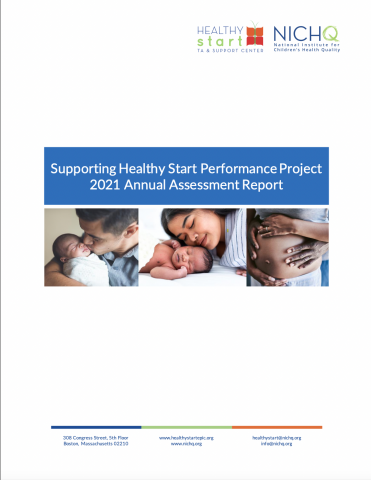DOWNLOAD | Supporting Healthy Start Performance Project 2021 Annual Assessment Report
Launched in 1991, as a response to the nation’s high rate of infant mortality, the federal Healthy Start (HS) program has created partnerships and linkages to services, and improved systems of community care to address disparities in perinatal outcomes for communities “with the greatest risk of losing their babies” in the first year of life. The HS program grantees currently represent 101 distinct communities exhibiting higher than average rates of infant mortality and consist of three Tribal Nations, at least one Appalachian community, and a mix of urban, border, and rural communities across the country serving populations of predominantly African American and Latino/a families. The HS communities’ common thread is poverty, lack of resources, and a need to address a constellation of social determinants of health, including housing, education, economic inequality, transportation, poor access to high quality food, high crime, racism, and racial bias that are contributing to poor maternal and infant health outcomes.
To address these community challenges, HS grantees deliver a core set of evidence-based services; these services are effective because they are tailored to the geographic, social, ethnic, and cultural needs of the populations served. The program has been an important resource for families, providing them with a pathway to information and services starting during pregnancy and continuing through the first 18 months of a child’s life that, often, they would not have otherwise accessed. In addition to services to individuals, HS programs are tasked with mobilizing various community stakeholders (e.g., residents, service providers, local organizations) through Community Action Networks (CAN) to coordinate and integrate services and steer local action to address social determinants of health related to poor birth outcomes. The HS workforce, including community health workers (CHW), play an important role in the success of these programs, and as such, the national HS program prioritizes staff and CHW develop ment, improvement, and monitoring.
During the current funding cycle (2019-2024), the National Institute for Children’s Health Quality (NICHQ) leads the Supporting Healthy Start Performance Project (SHSPP) and serves as the TA & Support Center (TASC) to foster improved service delivery by HS program grantees across the country. To meet the diverse needs of grantees, NICHQ will deliver capacity-building assistance (CBA) to:
-
Improve the consistency and quality for content of HS services delivered through CBA for HS staff in the core competencies and concepts central to the four HS approaches.
-
Increase the delivery of evidence-based services and those based on best practices.
-
Ensure that the HS workforce has appropriate knowledge, and demonstrable skills and
competencies to provide services.
-
Increase data collection and data use for quality improvement (QI), performance monitoring, and
local evaluation.
-
Promote synergy among HS grant recipients through meaningful collaborations that are aimed at
improving perinatal outcomes and reducing disparities.
-
Support grantees in the development of specific, measurable, attainable, realistic, and timely
(SMART) objectives, as well as sustainability and succession plans.

DOWNLOAD | Supporting Healthy Start Performance Project 2021 Annual Assessment Report
NICHQ conducted the 2021 Annual Assessment to understand projects' organizational structures, satisfaction with the TASC, programmatic needs, progress toward benchmarks and key objectives, data capacity, and progress towards sustainability. Like the Needs Assessment from 2019 and the 2020 Annual Assessment, this year’s Annual Assessment sought to identify salient programmatic activities for the TASC. In this report, we describe the Annual Assessment’s methods and results, synthesize findings, and describe next steps for the TASC.
